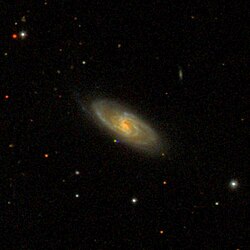|
NGC 716
NGC 716 is a large barred spiral galaxy located in the constellation Aries,[4] about 200 million light-years away from the Milky Way. The luminosity class of NGC 716 is I and has a large HI line.[5] It also contains regions of ionized hydrogen. Many non-redshift measurements provide a distance of 54,023±8,169 Mpc (~176 million light years), which is within the distances calculated using the redshift value.[6] HistoryNGC 716 was discovered in 1886 by American astronomer Lewis Swift using a 40.64 cm (16 inch) optical telescope that used a mirror as a light-gathering element. It was also observed by the French astronomer Guillaume Bigourdan on 1 January 1892 and was added to the Index Catalog with the code IC 1743. References
See alsoExternal links |
||||||||||||||||||||||||||||
